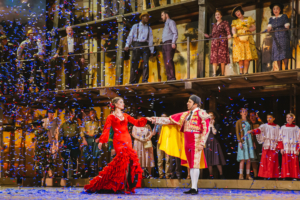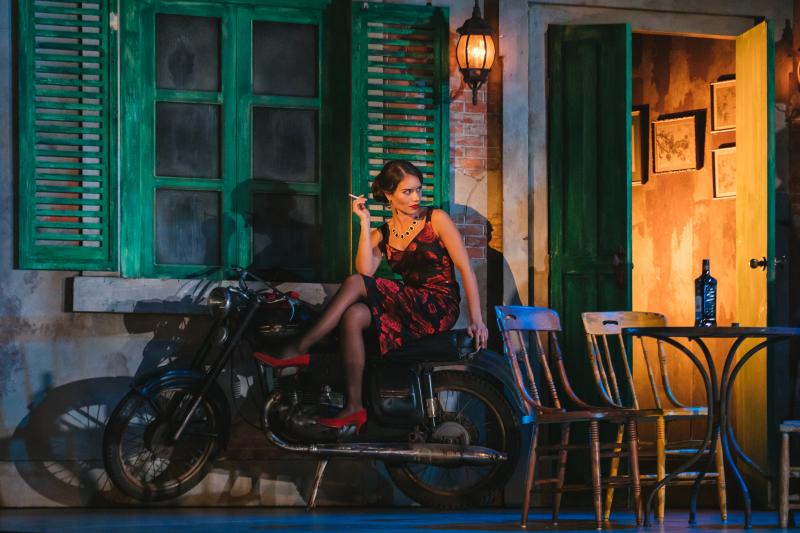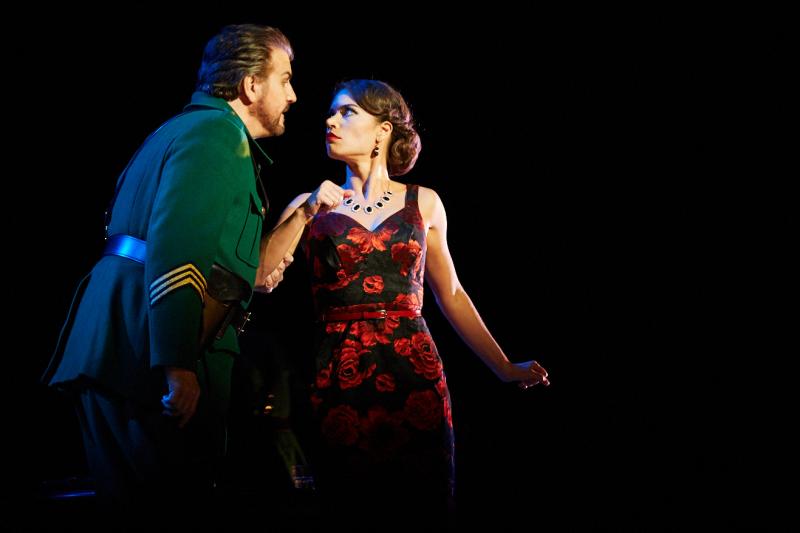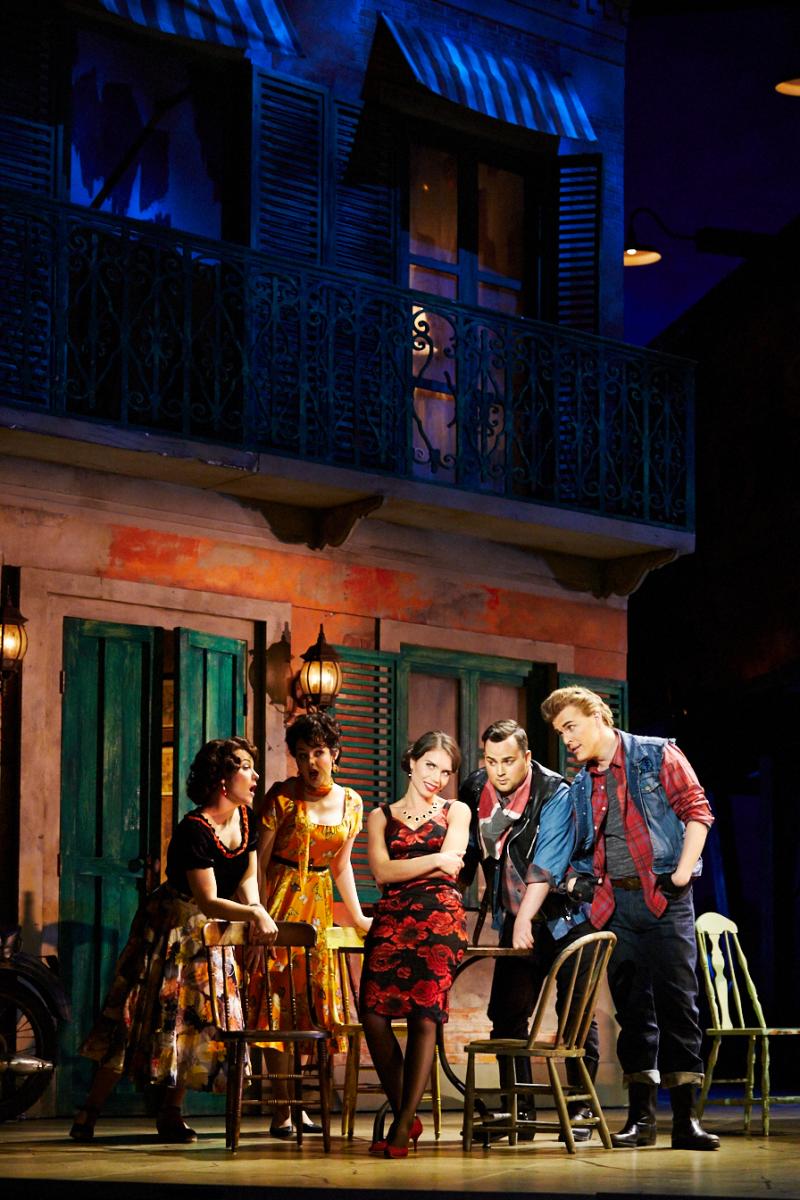Interview: Ginger Costa-Jackson, Part 2: Mopping, Not Moping

EM: You sang in the 2010 Centennial of Fanciulla at the Met.
GC-J: It was very fun, and funny for me, a 21-year-old Wowkle having a papoose baby on my back. It was the same baby doll they used in the one with Plácido (1991), terribly old, a little on the scary side.
EM: A vintage doll.
GC-J: They had to paint her up and do the hair and everything, so by the time we got to stage it was good looking again. Debbie Voigt has this fantastic, very quick change. I'll never forget one night her zipper got stuck. The dresser was backstage with her, I'm out front and I know she's supposed to come out but she hadn't yet, so I'm still tapping the papoose, trying to look "Doo-da-doo" [Laughs]. Suddenly I hear [makes a "rip" sound]. They had to rip the dress off her. she only missed one little line, but...it's live theatre, and that wasn't for the HD but it happens, because you have these very quick changes.
EM: It makes it even more memorable.
GC-J: Exactly.
EM: You're just back from Spain.
GC-J: Donna Elvira, my first Don Giovanni. Before that, La Belle Hélène in Boston. Before that, San Francisco Symphony, L'enfant et les sortilèges, then I was in Carmen here. So since I was last here I've had 3 jobs one right after the other, 1 red eye flight to get to the next rehearsal.
EM: And you're doing Cherubino.
GC-J: Yes, La Monnaie in Brussels, a Mozart trilogy. They're doing The Marriage of Figaro, Così fan tutte, Don Giovanni all together. I'll be performing Cherubino and Dorabella. Each singer has 2 roles. In the opera they're not singing, they appear as their character. The concept is to marry all of these operas. For example, Donna Anna--I assume, since I haven't begun rehearsals yet--when she finds her father dead, she says, [Sings] "Io manco, Io moro." That's what Fiordiligi and Dorabella say-they split the 2 lines right before their fiancés are going off to war. [Sings] "Bella vita militar." A lot of ideas. The same composer, Da Ponte's stories. I think they're going to weave the stories into a through-line. The performances are back to back, so one night I'll have to prance around like a boy, then have to shake it off and the next night be a girl [Laughs].
EM: But how wonderful to be steeped in Mozart.
GC-J: I know. It's funny, I'll do 4 months of these 3 operas. Then I'll come here and do Musetta in la bohème, then fly to Paris and do Despina, the servant, not Dorabella. Then I can't say where but I think I'm going to do another Dorabella/ Cherubino. So it will be a year where I'm only doing Mozart, but I love Mozart.
EM: Musetta. Interesting bit of casting. You're able to cross over from very low to high and in between.
GC-J: I just love a challenge. Maybe I've just got gumption. I find it interesting with Musetta [Sings] "Ma ti senti morir," at the end of the aria, that it's the same as when Rosina in Barbers ays, "Se Lindo-o-o-o-ro mio sarà..." So this high B is the same note Rossini singers are constantly going to. I do have those notes on the top. But Musetta is a very sensual woman. When you get to the next act where she's fighting, she has some very low notes, like, "Ti saluto." It's very low. When Mimi is dying, that little prayer, [Sings] "Fate la grazia a questa benedetta..." it has this low feeling. The aria does go high at this one point, but the next two are not high at all. Conchita Supervia, who was a mezzo, one of the original Cenerentolas--
EM: She was in a British film directed by Victor Saville.
GC-J: About Nellie Melba. These singers of the past. I listen to so many of these old recordings, they had the tradition, they could be onstage with people who had been with the source, who had worked with the composer and knew what they wanted. I think every young singer should be listening to these singers. Nowadays you can listen too, but it's more important to listen to people from the past.

EM: Amazing, to think of being the first to sing Donna Elvira.
GC-J: Fascinating. There's a recording of Bruna Rasa doing Cavalleria Rusticana with Mascagni--the composer--conducting. I had the opportunity to work on Nixon in China with John Adams. To have the composer be the conductor, you know what he wants [Laughs].
EM: Like The (R)evolution of Steve Jobs with Mason Bates. Is there any role that you've done or haven't done that's your favorite?
GC-J: It's like asking you what's your favorite violin solo. I love everything I get into. Rehearsing Cenerentola has been interesting. I've obviously learned the music before coming here. I've listened to it a lot. It touches my heart, it speaks to me. Cenerentola and Cherubino have special places musically for me. I love these roles. Of course I love Carmen too. But Cenerentola is interesting because acting her there have been a couple times where I've felt like crying. This music makes me emotional. Carmen is fascinating because she's put a wall up, doesn't allow people to hurt her. There's only one point where she opens her heart to Don José and says, [Sings] "Là-bas, là-bas dans la montagne..." If you love me you're going to take me on your horse and gallop away with me and be the person who maybe can love me. And when he says, [Sings] "No, je ne veux plus t'écouter," that dream is shut before her eyes. She closes her heart and says, "Fine. I don't care. Leave. I hate you. Take your crap. 'Bye." Boom, it's done. But Cinderella has such an open heart, she is not a pushover. She's mopping the stage, but not moping while she's mopping. Every time her sisters hurt her, she doesn't sit there and cry. She's strong, resilient. She thinks, "Well, okay, what am I gonna do. Let me get busy, let me clean."

EM: That's an interesting perspective.
GC-J: She does the things she has control of in her environment. But other times--"Must I always be in the cinders, am I always going to be, [Sings] "Sempre fra le cenere, sempre da restar..." Am I always going to be covered in soot and unloved. All she wants is a sense of family, a sense of belonging. I have a moment with Miriam where I say, "Listen to me, sisters." Miriam goes, [Gasps] "How dare you call us your sisters. Don't profane to call us that awful name!" It's hilarious, because obviously she's my blood sister [Laughs]. And Miriam is such a ham, super funny. This is not a drama. Obviously Cinderella has some drama in her life, there's abuse happening. But the sisters and father are hilarious, completely funny and out there, which you have to be, otherwise it's going to be an Oliver Twist story, very sad. This is a comedy and people will laugh. You're going to feel bad for Cinderella, but you're going to laugh.
EM: We call it "dramedy."
GC-J: [Laughs] It is. Miriam has always been the class clown. She's the baby of the family, the jokester, maybe not so serious or studious. I'm the one who's, "Hey, we need..." Of course now she's older and has her own children, so she's learned how to be responsible.
EM: What a wonderful relationship. You love to see people onstage ham it up in Rossini comedies. Which sister is singing here in Onegin?
GC-J: Marina. She'll be coming for the Sisters concert. We're going to do opera, musical theatre, the [Sings] "Sisters, Sisters."
EM: Like the Three Tenors.
GC-J: Yes, except with shiny dresses [Laughs]. I love being onstage with my sisters. We have a 6th sense about each other, understand each other, love and support each other. I've had the opportunity to share the stage with sisters playing my sisters here in Seattle. Last summer I played Musetta to Marina's Mimi.
EM: The end must have been heart-wrenching.
GC-J: It's a very different ending. Of course I always cry at the end when Mimi is dying because it's such a beautifully written scene. But when you see your own sister on her deathbed, the idea of being so close to death...I'm caressing her head, trying to get the hair out of her face, tucking her in. I had to refrain, really push back out of my own imagination because I still have to sing the final prayer. After the prayer the floods can come forth and release and I cry hysterically--as it should be because Mimi was such a good person. I did a Carmen With Miriam where she was my Micaela. That's a different thing. There's only one confrontation in Act 3 for them to look at each other. She comes in to save Don José, little knowing he's the problem. We only ever have glances. I'll never forget the look she gave me. "You woman who took this man away...I'm a strong girl, I can confront you." She sees him battering me, pulling my hair. I always find a moment to look over at Micaela and say with my eyes, "Look at what he is." Everyone always says Carmen has stolen him from Micaela. I say Carmen has saved Micaela. If he's the kind of man who when he doesn't get what he wants he hits a woman, he would have hit his own wife. Because Micaela's a good girl, she might have lived and suppressed her words. Or if not, she would have had to stay married.
EM: As an artist, do you do what inspires you?
GC-J: Absolutely. It's like we're water. You put us in a cup, we form to the cup. You put us in a bowl, we form to the bowl. You look for perfection, truth. It's this ever-driving force in your life. Our cells and mood and hormones are constantly changing. Every day we feel things differently. One day I might feel a scene sad or happy based on how that day is. As an actress you can't train your emotions. You have to allow that you're going to be an open, receptive vessel to whatever emotions want to come in that moment, without judgment. You're allowed to sing through that emotion for that night. If you don't, if you think, "Well, that's not what I should be doing. I should be delivering this sad." If you try to impose that upon yourself, you will lose the audience, and the scene.
EM: Having played the violin, what kind of music did you like to play best?
GC-J: All the fast bits [Sings]. More like Spanish style, things I can really bite the bow in. I love these Boleros. As opposed to soft. Marina played cello. She liked that low, sad music. She's doing all this Onegin, Pique Dame, Vissi d'arte. These women who are very sad. I think that's why I love Rossini so much, it's very active. There's something about the pitter patter you can just feel in your tongue. Like the flamenco of Carmen, my castanets. I like to express myself through my body in a way that physicalizes, very rhythmic and dotted. Musetta is that. Full of fire. Miriam wanted to play flute. She has those super extreme highs. So we're mezzo, spinto soprano and high coloratura. We all have a different sensibility. Raised with the same family we have the same language. What I love about singing with my sister is I know my "Ah" vowel will be the same as hers. If we're singing in thirds it will create overtones. When you're with someone different, sometimes they have a different vowel sound. Even that slight difference creates a blend isn't as beautiful as it can be. As the bottom voice if I hear someone having more of an "Ah" sometimes I'll try for the sake of the performance to make it a little brighter myself so it can blend. But what's good with my sisters is we're going to pronounce the same way. That's already set.
EM: All in the family.
GC-J: Yes!
EM: Thank you so much, Ginger, for your wonderful insight. I'm delighted.
GC-J: I'm delighted, too!

Seattle Opera's Cinderella runs from Oct. 19-Nov.1 https://www.seattleopera.org/on-stage/cinderella/
Photo credits: Sunny Martini, Philip Newton
Comments

Videos

